2019 NPH Home Highlights
Read about some of the highlights from the NPH homes in the nine countries we serve.
…
| Bolivia … In 2019, 10 out of 12 of our children’s houses started their own garden project and grew a variety of vegetables. These gardens give the children a chance to acquire new skills in the field as well as learn the values of responsibility and patience. Food grown in our children’s gardens is used for meals, thus supplementing our budget. In addition, we were able to secure funding for a new tractor. It cost $53,000 and will greatly help with our agricultural program. Plus, using the tractor to cut grass and clear fields will create more recreational activity areas where our kids can play. We were also able to build a dairy and cow pasture for herding the cows for transport and vaccines. The dairy allows us to invest in more milking cows and will help us be more sustainable with our dairy and in turn help our budget. … |
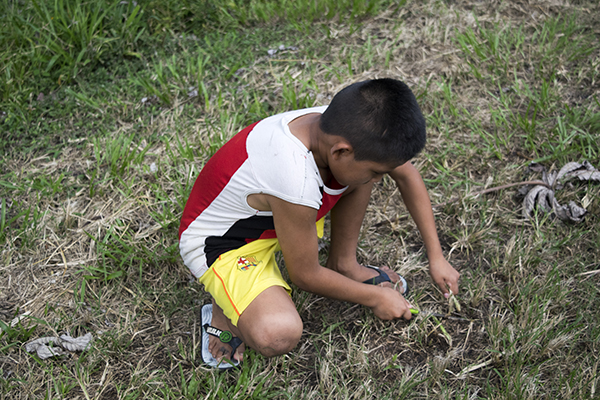 Helping in the garden … |
|
| Dominican Republic … Even though we have fewer pequeños living in our home, we are actually helping more children. Additional boys and girls from the community are attending our school, which offers grades K – 11. Also, more than 50 children received help through our transition home “Niños de Dios.” This transition home in Monte Plata helps strengthen Dominican families by providing care and security for children who are at high risk until their family situations improve. … Our San Marcos outreach program currently is helping 15 families that have individuals with special needs. By providing services such as financial support for food, medications, and small home improvements, as well as physical therapy, we are helping them to have a better quality of life. … |
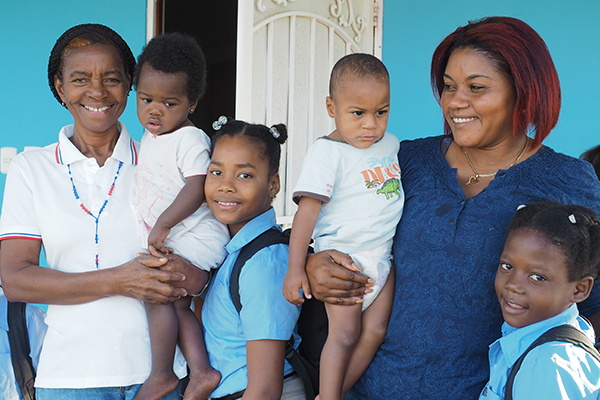 Children at staff at Niños de Dios in Monte Plata … |
|
| El Salvador … On June 29, we celebrated 20 years of helping children and youth. Over the years, NPH has touched the lives of more than 900 pequeños, all of whom make up our great extended family. Since our opening in 1999, the main purpose of our home has changed in response to national legislation around child welfare. Once a home solely for orphaned and abandoned children, NPH El Salvador evolved to serve two different populations: children who live inside the home and community students. Some of our community students are sons and daughters of hermanos mayores, people who were raised in NPH and are now independent adults. Currently, we support 258 community students with scholarships spanning from early education to university. These students come from low income families that cannot afford to support their children’s education, which is the case for most Salvadorans. … |
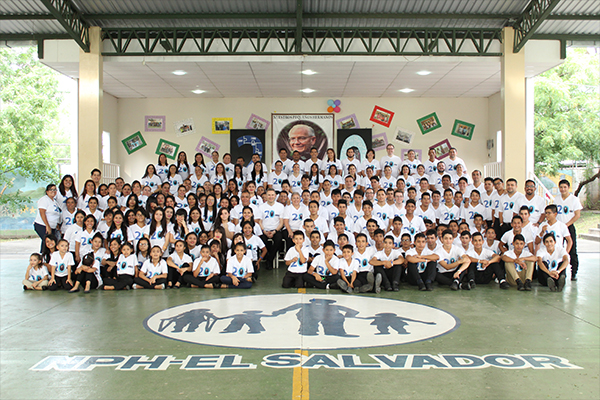 The entire NPH El Salvador family … |
|
| Guatemala … In 2019, we reaffirmed our commitment to a series of community aid projects initiated by the eruption of Volcano of Fire (Volcán de Fuego or Chi Q’aq’) in Guatemala in June 2018. Last year efforts shifted from disaster relief to the cultivation of community relationships at the organizational level. Through coordinated efforts, donations and resources were directed to municipal police departments, National Civil Police, local health clinics, and hospitals in the regions of Chimaltenango and Sacatepequez. Donated items include banks of chairs for waiting areas, medical scales and curtains, and household items such as refrigerators, microwaves, and folding tables. We also teamed up with the NGO Constru Casa Guatemala, whose Casas Hope project designed and constructed over a dozen homes for families impacted by volcanic activity. … Additionally, we opened a cost-free childcare center for single mothers, known as CCID (Centro de Cuidado Infantil Diario or Daily Childcare Center). Currently, CCID provides 21 children ages two to four from the nearby community of Parramos with an integrated education centered on NPH’s guiding principles and values. The program is intended to bring early childhood education to the forefront while taking pressure off single working mothers who have scarce economic resources. … |
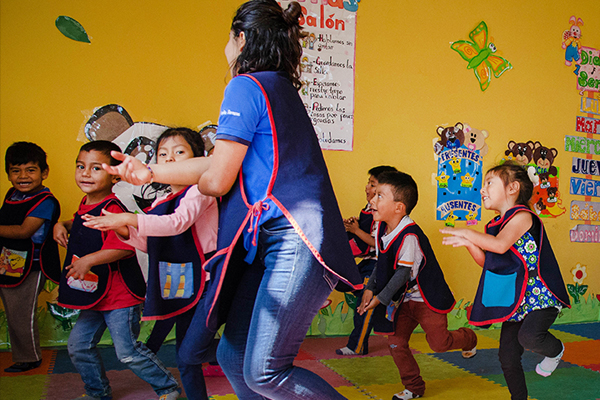 Having fun in the Day Care Center (CCID) … |
|
| Haiti … On March 6, two children from our special needs home, Kay Christine, participated in equestrian events at the Special Olympics World Games in Abu Dhabi, United Arab Emirates. Darlene Milford won one gold and two silver medals, while Christopher Philemon Pouloute was awarded one silver and one bronze medal, as well as a fourth-place finish. Both were first-time competitors in the Games. NPH Haiti is blessed to have such talented riders compete on a world stage and demonstrate that Haitian athletes are just as talented as others around the world when given the opportunity. … In addition, 21 students finished 12th grade and became the first-ever graduating class of the Fr. Wasson Angels of Light School, which was founded in response to the 2010 Haiti Earthquake. At our main home, St. Helene, we began offering an 11th grade curriculum. … |
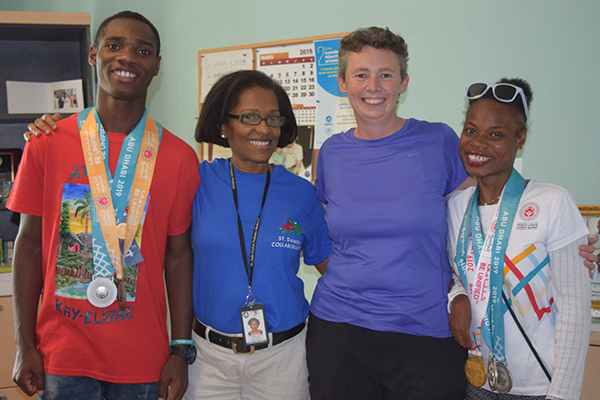 Special Olympics medalists Christopher and Darlene with Dr. Jacqueline Gautier and Jacinta McGuane of NPH Haiti … |
|
| Honduras … In January, 17 boys with special needs joined our family after the Honduran government abruptly shut down their care facility. … In conjunction with the Lipoid Foundation, we began construction of the San José Family Center to serve the neighboring communities of Mata de Plátano and Pueblo Nuevo. Our team — comprising a social worker, functional therapist, psychologist, teacher, and volunteer physical therapist — is currently working with four schools in the area to conduct evaluations to identify and address common problems, such as healthcare disparity, domestic violence, drug abuse, social exclusion, crime, and poverty. We are expanding our scope beyond the walls of our property to focus on supporting families before they encounter the difficulties that result in their disintegration. Our initiatives support education and foster empowerment. The center will deliver services not readily provided by the state or accessible to those living in rural areas. … … … |
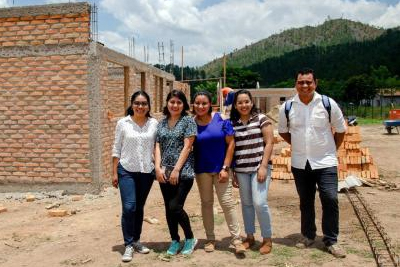 Construction of the San José Family Center is expected to be completed in 2020 … |
|
| Mexico … International Volunteer Alaina Hall of Plymouth, MN, completed an initiative through the University of Pennsylvania called Healthy Pequeños, where she worked all year to implement holistic and sustainable interventions to prevent pediatric infectious disease and improve the children’s physical health. As a result, seven sources of sewage exposure were eliminated, 730 children are now up-to-date on their vaccines, eight clinic spaces were repaired, giving 582 children access to sanitary clinic spaces, and more. The education initiatives of Alaina’a project are expected to be carried on by her successor in 2020. … Also in 2019, we built our own water purification system, which has resulted in a 79% decrease in expenditures. We also launched the Metlatonoc Clinic Project to work with local municipal authorities to provide support in the form of basic health services to Metlatonoc, one of the poorest communities in the state of Guerrero, where many of NPH’s children come from. Emergency aid is only accessible via a four-hour drive to the nearest town. We plan to bring Ofelia Galvez Olea, a pequeña originally from Metlatonoc who will graduate with a nursing degree in the spring of 2020, to Metlatonoc to provide first aid services, vaccines, parasite treatment, and disease prevention in an attempt to decrease the mortality rate and provide comprehensive healthcare for the people of the community. … |
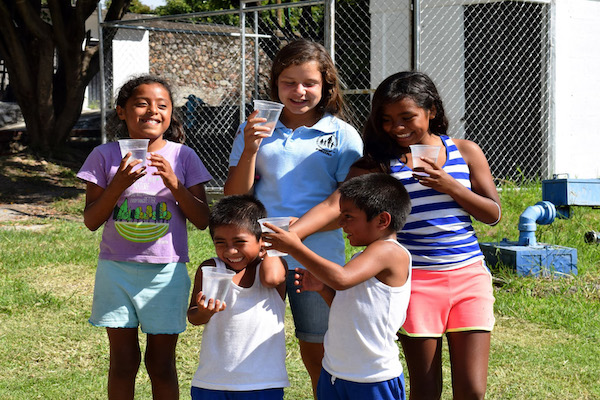 The new water plant has dramatically reduced expenses … |
|
| Nicaragua … Through programs in coordination with Nicaraguan government’s Ministry of Family, each year we receive more children from our surrounding communities. 2019 was no exception, with more than 160 children and adolescents from local towns and villages joining in workshops and activities. The socio-political problems that began in 2018 have not ceased completely, making activities more difficult to organize. However, our parenting workshops proved to be a success. Parents and tutors fulfilled their commitments by attending family gatherings while also following their children’s academic progress. We also saw more families participating in celebrations, vocational fairs, and cleaning campaigns for the school. Despite continued societal issues, our school studies throughout 2019 were unaffected and the academic cycles were fully covered in the time established by the Nicaraguan Ministry of Education. … |
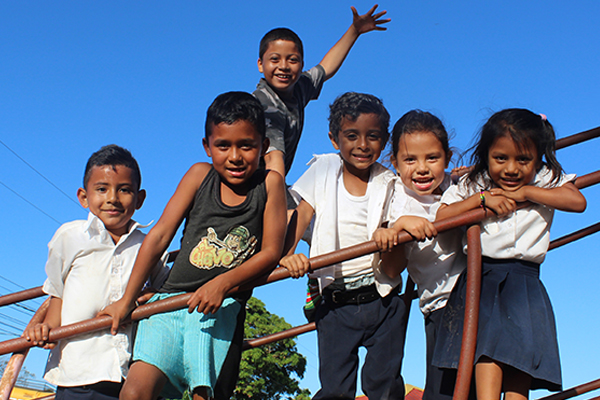 Some of the community students that attend our school … |
|
| Peru … In 2018, we joined forces with U.S.-based Cargill to implement a new agriculture project to cultivate nearly two hectares of land to grow crops on our property. Tilling and preparation of the land began in March 2019 and the first corn seeds were sown in May. The harvest was ready by October, yielding 82,850 kilograms of corn. From the sale of the harvest, we collected $39,007 and recouped the initial investment in the crop. Through this project, we will create local jobs, help strengthen the local economy, and revive the soil for future crops. … In June, we implemented a family strengthening program, called “Parenting with Love and Limits.” It opened with workshops presenting subjects that pose the most problems, supporting approximately 80 parents so far. By the end of 2019, 31 workshops had taken place, and we plan to expand the program in 2020. Towards the end of the year, Rafael Arce Guillen became our new National Director. Rafael is an hermano mayor (“older brother”) who was raised at NPH Honduras, and previously served as NPH Peru’s House Director. |
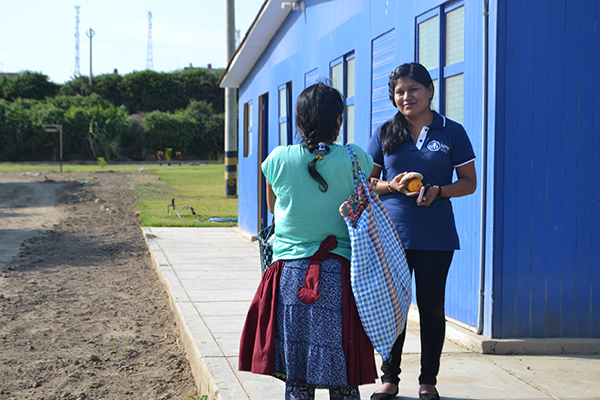 Our social worker talking with one of the parents in our new educational program. … |
…
THANK YOU FOR YOUR SUPPORT! You are helping raise children, support families and transform countless lives!
…
Contributed by Brad Bobel, NPH Bolivia; Alba Pérez, NPH Dominican Republic; Carmina Salazar, NPH El Salvador; Spencer Cappelli, NPH Guatemala; Denso Gay, NPH Haiti; Arielle Augustin, NPH Honduras; Linette Gomez and Sofi Estrada, NPH Mexico; Scarleth Mendieta, NPH Peru; and Nicholas Rogers, NPH International.
Related Information:
• How Your Help Makes an Impact at NPH







